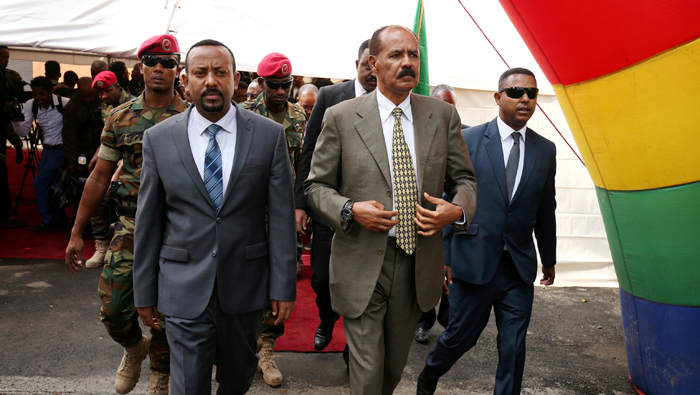
Addis Ababa: The leaders of Ethiopia and Eritrea re-opened crossing points on their shared border on Tuesday for the first time in 20 years, clearing the way for trade between the former foes after a stunning reconciliation.
Thousands of people from both countries watched one ceremony in Zalambessa, an Ethiopian border town that was reduced to rubble soon after hostilities between the neighbours broke out in 1998.
Soldiers and civilians waving Ethiopian and Eritrean flags lined the road as Ethiopia's Prime Minister Abiy Ahmed and Eritrean President Isaias Afwerki opened the frontier in a ceremony broadcast live on Ethiopian TV.
"This is the happiest day of my life," Ruta Haddis, an Eritrean from the town of Senafe just across the frontier, told reporters.
"I never thought this would take place in my lifetime."
The war over their border and other issues killed an estimated 80,000 people before fighting between Eritrea and Ethiopia ended in 2000 in a contested peace deal.
Tensions burned on over the position of the frontier - until Abiy offered to end the military standoff this year as part of a package of reforms that have reshaped the political landscape in the Horn of Africa and beyond.
Ever since, landlocked Ethiopia has made it a priority to reopen roads connecting it to Eritrea, which has ports on the Red Sea.
The two leaders also opened another frontier crossing at Bure, Eritrea's Information Minister Yemane Meskel said in a tweet.
Pictures posted online by Abiy's chief of staff showed the leaders talking and walking side by side, Abiy in camouflaged military fatigues and Isaias wearing sandals and a safari suit.
The Bure region saw some of the fiercest fighting during the 1998-2000 war.
Eritrea and Ethiopia share a border that stretches for more than 1,000 km (620 miles), but there were no details of other border openings on Tuesday.
The Eritrean and Ethiopian leaders have moved swiftly to end two decades of hostility since signing a breakthrough agreement in Asmara on July 9 to restore ties.
Eritrea reopened its embassy in Ethiopia in July, and Ethiopia reciprocated last week.
The two countries have resumed flights.
Eritrea has agreed to open up its ports to its landlocked neighbour and last week announced plans to upgrade a connecting road.
The two leaders also celebrated Ethiopian new year together at the border with their troops on Tuesday, Abiy's Chief of Staff, Fitsum Arega, said. Ethiopia follows a calendar similar to the ancient Julian calendar - which started disappearing from the West in the 16th century - meaning the country entered its year 2011 on Tuesday.